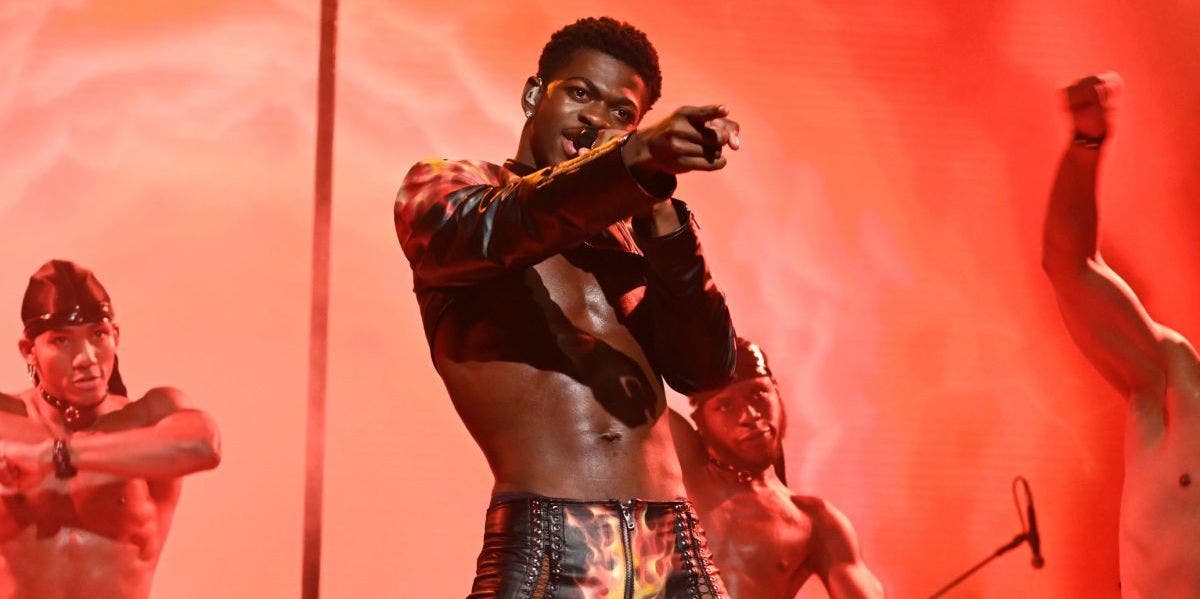Why Lil Nas X Is Just The Beginning Of The Black Queer Rebellion — And We're Ready For It
Lil Nas X is living his authentic life — may other Black queer kids get to do the same.
 SNL
SNL Lil Nas X caused quite the stir recently when he released his music video for “Call Me By Your Name (Montero),” as well as when he performed the song on SNL this weekend — and not just because of his wardrobe malfunction.
Showcasing the struggle between religious ideology and queer identity, he caused a “satanic panic” amongst parents and Christian clergy members across the country.
The video and his live performance are both tongue-in-cheek reactions to the pressures queer people experience in a morally “puritanical” society that does not support identities that veer away from the norm.
Lil Nas X is a phenomenon because he has successfully brought the aesthetic and sound of queer underground music culture to the mainstream.
As an openly queer Black man protesting against religious bigotry utilizing notoriously homophobic and racist creative outlets, his work is revolutionary.
And he is now suffering the consequences.
Following the video’s release, Lil Nas X has been the target of bigoted pundits across the nation condemning his artistic expression and calling him "evil." He's also had streaming contracts neutralized because of the uproar.
The silencing of Black queer artists is nothing new — and it is the reason why so many queer artists have remained in underground spaces.
Despite mainstream rebuttals, queer artists have at times managed to influence the mainstream effortlessly, yet at others still find themselves the victims of blatant perjury and heteronormative whitewashing of their crafts.
This has not stopped the wheel of consistent, provocative creativity, however.
Queer rap performers such as Cakes Da Killa among others have been present in the rap game scene since the early 2000s and before, though their sexuality and unfiltered artistic creations caused a stir in a traditionally heteronormative hip hop scene.
Performing in DIY venues and clubs across the country, a vibrant scene of queer and trans performers creates trends that inevitably filter over to the mainstream after running their course in warehouses and basements.
Now that Lil Nas X has achieved international recognition, it can easily be assumed that speculation surrounding the meaning of queer music will broaden.
The risks are evident. The scene could suffer from voyeurs who steal the aesthetics and rhymes that were once ignored. It could also mean further gatekeeping attempts to ensure that marginalized voices are stifled.
From festivals such as “The Multivrs is Illuminated” to the historical vogue Ball scenes of New York City, Black queer culture has maintained its underground vitality by daring to create spaces of their own.
Facing racism in white gay spaces and defamation from their own communities, Black LGBTQ people have had no choice to remain autonomous within their creations.
That same legacy is finding root in the younger generations of queer Gen Z members and their ability to question and research the world around them.
Recent studies have shown that one in six Gen Z adults identify as queer or trans.
This shift is notable due to the hypervisibility of queer representation within independent media and some mainstream outlets.
While there has been a rise in the prevalence of queer "safe spaces," Black and people of color who identify as LGBTQ are often left out due to either class, race or both.
So while white members of the LGBTQ community have felt the benefits of these resources, Black people specifically have felt the brunt and found solace on the margins.
The fact that Lil Nas X has achieved success as an independent artist is a highlight of what the online music scene can provide for formerly marginalized spaces.
Of course For Lil Nas X to break the mold with chart-topping success, all of the hypocrisies of what makes a “pop” star have been exposed as well.
It’s no secret that white musicians are able to escape scrutiny when it comes to their “controversial” music videos.
Does Lil Nas X deserve to be alienated because he made a music video condemning the bigoted views that caused him distress in his own life?
The intersections of race, gender and sexuality have always been at play when it comes to industry exposure.
To this day, there remain closeted individuals who are very aware of what could happen to their careers if they were outed. To challenge it is to risk blacklisting and lack of revenue.
The status quo has ensured that monotony reigns within popular music. To truly be an individual within the factory, it must be approved by labels who ensure its profitability and profitability often plays it safe by adhering to those who have no concept of individuality.
While religious zealots condemned Lil Nas X for subliminally enticing young, impressionable minds with Satanic homosexuality, the irony refuses to be let down.
In a world where toxic love songs, homophobia, misogyny, and a false sense of identity rule the airwaves, the true individualist stands accused of rotting the very social fabric we inhabit.
Lil Nas X started out in the DIY world and has now captured a global audience. His music video exposed the many layers that those who came before him railed against — the alienation, the condemnation, the silencing of Black gay men within the hip hop world.
With him out there, there's nowhere we can't go from here.
In my honest opinion, I think that Lil Nas X is doing the Lord’s work.
Monika Estrella Negra is a freelance journalist, filmmaker and curator of all things radical in media.
